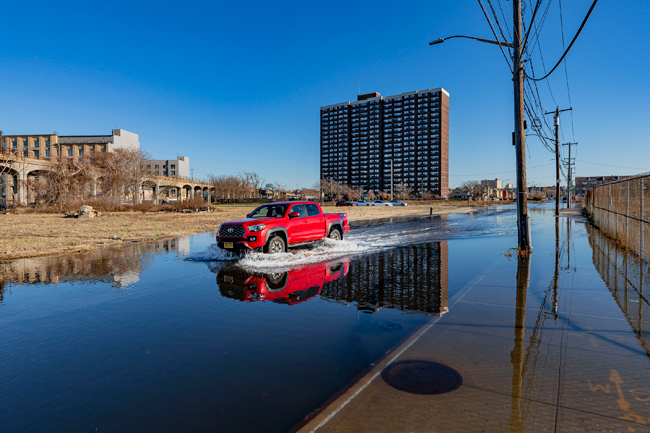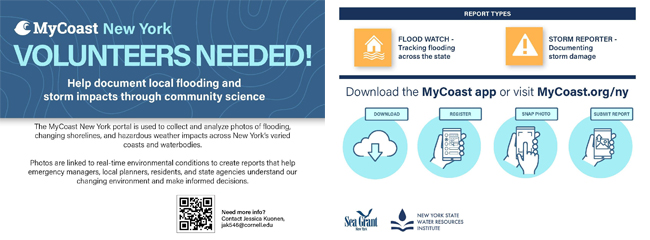
A truck plows down a flooded city street near the shore in Far Rockaway, Queens. This photo was taken in January 2022 during a “sunny day” high-tide flood event. “Sunny day” floods, also called “nuisance” or “tidal flooding,” bring a range of impacts to coastal areas. Credit: Giles Ashford, NYC Community Flood Watch Project
— By Rich Pietras for Brooklyn College's BC News
Community engagement is the focus of a recent round of national funding aimed at mitigating problem flooding
Brooklyn, NY, April 21, 2023 - Brooklyn College Earth and Environmental Sciences Department faculty Brett Branco—also the executive director for the Science and Resilience Institute at Jamaica Bay (SRIJB) — will join New York Sea Grant (NYSG) project administrators (NYSG Associate Director Kathy Bunting-Howarth and NYSG Coastal Resilience Extension Specialist Katie Graziano) on a project receiving two years of funding totaling $150,000. The funding is part of a pool of $8.1 million in national investment funds to strengthen resilient coastal communities by helping to mitigate and find solutions for problem flooding.
Specifically, Branco and the SRIJB will receive support to host and mentor a CUNY graduate student to develop leadership in the field of coastal resilience. SRIJB’s strong network of partners across disciplines and practices will contribute to building a science-based community around nature-based solutions.
“In partnership with NYSG, the SRIJB fills a vital role in New York City both as a hub for user-driven research that informs climate adaptation decisions, and as a convener for knowledge exchange amongst academics, government agencies, and community-based organizations,” said Branco. “We are very excited to engage graduate students in this important work and provide opportunities to learn how to lead the interdisciplinary and transdisciplinary work necessary to reach equitable climate solutions.”
Along with NYSG, the SRIJB will produce forums, workshops, and data visualization and communications products as well as formalize a community of practice to share key findings with local, national, and international audiences. The goal is to connect diverse end-users in New York City and New York State with relevant expertise about natural and nature-based features (NNBF) as multi-beneficial, more resilient alternatives to traditional shoreline armoring.
This work builds upon ideas detailed in a journal article published last year in Ecology and Society on “operationalizing resilience” — how to define resilience in a way so that it can be measured, assessed, and promoted in design and policy. Before the development of the monitoring framework, there was no way to track these benefits.

Download the MyCoast NY app and help document local flooding and storm impacts through community science.
An additional $125,000 in national support will allow NYSG to create a train-the-trainer program to grow Community Flood Watch in NYC and develop extension and outreach resources for the pilot MyCoast NY program to expand the use of a publicly available, centralized database of crowd-sourced photos of flooding, storm damage, and shoreline change from across the state.
MyCoast NY, a downloadable app and web portal developed by NYSG and the NYS Water Resources Institute, is used to collect and analyze photos of flooding, changing shorelines, and hazardous weather impacts across New York’s various water bodies, building off of the work of the Community Floodwatch Project and expanding it statewide.
The full announcement can be found on the New York Sea Grant website.
More Info: New York Sea Grant
New York Sea Grant (NYSG), a cooperative program of Cornell University
and the State University of New York (SUNY), is one of 34 university-based
programs under the National Oceanic and Atmospheric Administration’s
National Sea Grant College Program.
Since 1971, NYSG has represented a statewide network of integrated
research, education and extension services promoting coastal community
economic vitality, environmental sustainability and citizen awareness
and understanding about the State’s marine and Great Lakes resources.
Through NYSG’s efforts, the combined talents of university scientists
and extension specialists help develop and transfer science-based
information to many coastal user groups—businesses and industries,
federal, state and local government decision-makers and agency managers,
educators, the media and the interested public.
The program maintains Great Lakes offices at Cornell University, SUNY
Buffalo, SUNY Oswego and the Wayne County Cooperative Extension office
in Newark. In the State's marine waters, NYSG has offices at Stony Brook
University in Long Island, Brooklyn College and Cornell Cooperative
Extension in NYC and Kingston in the Hudson Valley.
For updates on Sea Grant activities: www.nyseagrant.org has RSS, Facebook, Twitter, Instagram, and YouTube links. NYSG offers a free e-list sign up via www.nyseagrant.org/nycoastlines for its flagship publication, NY Coastlines/Currents, which is published quarterly.